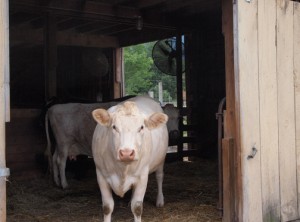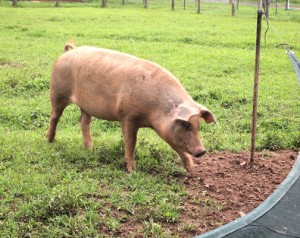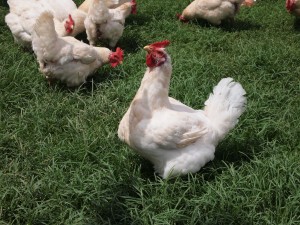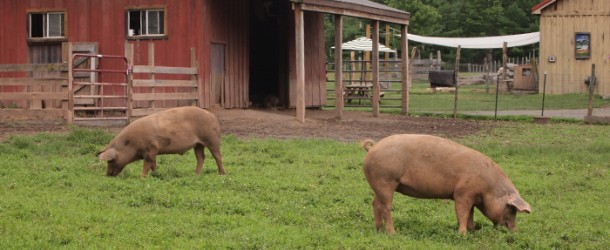We are in that holiday time of year when giving takes center stage, so now is a good time to focus on both end-of-year charitable contributions and volunteer and advocacy planning for the animals in the coming year.
It’s important to take stock of the big picture before making decisions about our own priorities. In finding my own way, I have categorized animal issues six ways:
 Companion Animals: homeless pets, cruelty and neglect issues, dog fighting, over population, puppy mills, etc.
Companion Animals: homeless pets, cruelty and neglect issues, dog fighting, over population, puppy mills, etc.- Farm Animals: to tackle this one, first decide whether you believe that animals should be used for food at all. Most of us on Chic Vegan are, well, vegan, so this is a no-brainer. But others don’t object to the idea of animal agriculture, just the means by which we accomplish it. If you think it’s acceptable to use animals, but you want them to have better protections, there are ways to influence conditions. If you believe it is NOT alright to use them at all, you are looking at a different path.
- Performing and Exotic Animals: this includes circuses, SeaWorld and similar parks, zoos, private exotic pet trade, carriage horses, animals in film, television, theater, etc.
- Animal Experimentation: animals are used for medical research, and for medical and veterinary training, but also in military exercises, cosmetics and household products testing and a variety of other areas.
- Wildlife Conservation: endangered species, loss of habitat, climate change issues, poaching, and hunting regulation.
- Fur, Skin & Feather Trades: obviously fur, but also leather, snake skin, ostrich skin, down and for many of us, wool and silk.
Ponder each area, above. Which ones pull on your heart and mind? What ignites your passion? In listening to your passion, you can best decide where you want to participate.
Consider your resources. If you over-commit or try to do everything you will likely burn yourself right out, get discouraged, and give up. Your resources include:
- Money: are you interested in making charitable contributions part of your animal advocacy work? If so, how much money will you be comfortable giving? Tithing is a powerful tool for the giver as well as the receiver, but that may feel overwhelming to you. Think about your financial resources and decide what you have to give.
- Time: Do you work full or part time or are you retired? Do you have three small children at home or are you live alone? Do you enjoy volunteer work? If so, how much time do you want to spend volunteering for the animals?
- Skills & Knowledge: You may be surprised at how many useful skills you have. Are you social media savvy? An Excel guru? A great organizer? A creative writer? A photographer? Do you bake? Cook? Are you a runner? Are you great at time management? Do you have a spare room? A big and/or reliable car? A good video camera and editing experience? Are you great with numbers? You’ll be surprised how useful you can be.
- Connections: sometimes we know someone who might have resources we don’t have and we can recruit others to help as well.
Finally, consider your temperament. Read each of the following suggestions, imagine yourself doing that task, and observe how you feel:
- “Get naked for the animals” in a PETA booth at a public event.
- Stand on college campuses, hand out brochures, and talk to non-vegans about veganism through Vegan Outreach.
- Take a shelter dog for a run/walk.
- Work on computer based tasks at home, such as social media, accounting, payroll, marketing content or fund raising correspondence.
- Organize a fund raiser for your favorite organization.
- Serve on a Board of Directors for a nonprofit.
- Muck out stalls or barns at a nearby farm or exotic animal sanctuary, or cages at your local shelter.
- Become a docent for an animal sanctuary, leading visitors on tours.
- Bake goodies to be sold at a bake sale.
- Create a social media campaign for a struggling non-profit.
- Throw a sensational party fund raiser in your home.
- Lobby your legislators, create and sign petitions.
- Attend or help organize rallies, charity runs, and protests.
- Become an undercover investigator for Compassion Over Killing or Mercy for Animals.
 If you are like me, some of the above ideas will appeal to you and some will make you want to flee in terror. (My “get naked in public” days are long gone.) Your personality will tell you how you want to contribute.
If you are like me, some of the above ideas will appeal to you and some will make you want to flee in terror. (My “get naked in public” days are long gone.) Your personality will tell you how you want to contribute.
Find the brand of activism that suits you. Not every action is for everyone, and not every organization is for everyone. Do you want to work locally, nationally, internationally, or a mix? Do you prefer a larger organization with a bigger reach, or a smaller organization targeted to one specific goal?
Do your own research until you find your advocacy soul mates. I’ve offered some suggestions below to get you started. Please share your own advocacy ideas in the comments section.
How You Can Help
- Companion animals: Adopt, don’t shop. Don’t buy pet supplies in stores that sell animals. Tell them why you aren’t buying there. Sign petitions, write your legislators, and call them when cruelty issues come up. Let them know what you think about puppy mills, breed-specific legislation, animal fights, etc. Volunteer for a local shelter. Foster a mama cat and her kittens. Take a shelter dog for a run or walk. If you are really brave, you can join one of the underground kinds of groups that rescue bait dogs from dog fighting rings (do not try this on your own!). Volunteer with a rescue group to be a foster, a transport driver, or to post updates on social media. Socialize scared animals at the shelter to help make them more adoptable. Contact your local shelter or, if you prefer, major groups like the ASPCA, various Humane Societies in different locales or rescue groups. If you love German Shepherds, for instance, Coastal German Shepherd Rescue does great work in Southern California. There are many breed-specific rescues. Find your favorite breed and help them out. One of my personal favorite organizations is Leave No Paws Behind, which concentrates on the old, special needs, sick and neglected animals who are least likely to get out of the shelter alive. Some groups specialize in transport, like Underground Railroad Rescued Kitty Network, which is always seeking donations and conductors for their transports. I dare you to watch one of Hope for Paws rescue videos without getting misty. Many organizations have Wish Lists on Amazon, where you can buy something they need and it will be shipped directly to them. Be creative! Photographer Mary Shannon Johnstone’s Landfill Dogs project seeks to highlight individual dogs at immediate risk for euthanasia. Ms. Johnstone has helped secure eleventh hour rescues for many pups.
 Farm Animals: Most Chic Vegan readers have already crossed the first hurdle, but for the veg curious, you must first decide where you stand on the use of animals. If you don’t believe in using them, the answer is to go vegan. If you don’t want to go vegan, contact organizations like Humane Farm Animal Care or Farm Forward to learn what protections you can seek when trying to minimize cruelty. Both of these organizations have knowledgeable people who are willing to talk you through the issues. Before becoming vegan, I was looking for eggs from “humanely raised” hens. I discovered the Certified Humane label standard, which addresses some cruelty issues. But even if you get Certified Humane eggs, there are some industry practices that are systemic and cannot be avoided. For example, it is considered acceptable to debeak baby chicks with a hot iron and no anesthesia. It is done quickly and roughly and often makes it hard for the chicken to eat. Debeaking is under review with Humane Farm Animal Care, but still being practiced. Male baby chicks are considered by-product of the egg industry, just like male calves are by-product of the dairy industry. Male baby chicks are thrown live into a macerator to be shredded like your junk mail, or gassed to death, or sometimes just thrown into a plastic bag and tossed in the trash to suffocate and be crushed under the weight of hundreds of others. Male calves are sent to the veal farm or to meat market, or just left to die. And dairy cows and laying hens all end up in slaughter. Read the Certified Humane Standards to learn what is and isn’t required to be labeled Certified Humane. As you can see, if you aren’t prepared to go vegan, seeking “humane” suppliers is a complicated issue. If you want to be a conscious consumer, you need to think about what you can support and what you can’t. That answer varies for each of us. Note that even eating vegan doesn’t guarantee you won’t be caught in the web. Palm oil is often sourced by poachers in a way that is destroying habitats and killing off the orangutans. So you have to be ever watchful in your consumption. You can also donate to and volunteer for organizations like Farm Sanctuary – a great organization run by a great man, Gene Baur, who is doing wonderful work in the areas of rescue, education, legislative lobbying and sanctuary. There are other organizations all over the world doing similar work: The Gentle Barn, Woodstock Farm Animal Sanctuary, Edgar’s Mission, and Animal Place, to name a few. There are also important efforts to stop the horrific practice of live export. Education efforts are key to changing the future. Consider becoming a Main Street Vegan Lifestyle Coach. Many sanctuaries need volunteers for events and regular animal feeding, barn cleaning, etc. Find what sings to you, whether it be mucking out stalls or writing the biggest check you can manage.
Farm Animals: Most Chic Vegan readers have already crossed the first hurdle, but for the veg curious, you must first decide where you stand on the use of animals. If you don’t believe in using them, the answer is to go vegan. If you don’t want to go vegan, contact organizations like Humane Farm Animal Care or Farm Forward to learn what protections you can seek when trying to minimize cruelty. Both of these organizations have knowledgeable people who are willing to talk you through the issues. Before becoming vegan, I was looking for eggs from “humanely raised” hens. I discovered the Certified Humane label standard, which addresses some cruelty issues. But even if you get Certified Humane eggs, there are some industry practices that are systemic and cannot be avoided. For example, it is considered acceptable to debeak baby chicks with a hot iron and no anesthesia. It is done quickly and roughly and often makes it hard for the chicken to eat. Debeaking is under review with Humane Farm Animal Care, but still being practiced. Male baby chicks are considered by-product of the egg industry, just like male calves are by-product of the dairy industry. Male baby chicks are thrown live into a macerator to be shredded like your junk mail, or gassed to death, or sometimes just thrown into a plastic bag and tossed in the trash to suffocate and be crushed under the weight of hundreds of others. Male calves are sent to the veal farm or to meat market, or just left to die. And dairy cows and laying hens all end up in slaughter. Read the Certified Humane Standards to learn what is and isn’t required to be labeled Certified Humane. As you can see, if you aren’t prepared to go vegan, seeking “humane” suppliers is a complicated issue. If you want to be a conscious consumer, you need to think about what you can support and what you can’t. That answer varies for each of us. Note that even eating vegan doesn’t guarantee you won’t be caught in the web. Palm oil is often sourced by poachers in a way that is destroying habitats and killing off the orangutans. So you have to be ever watchful in your consumption. You can also donate to and volunteer for organizations like Farm Sanctuary – a great organization run by a great man, Gene Baur, who is doing wonderful work in the areas of rescue, education, legislative lobbying and sanctuary. There are other organizations all over the world doing similar work: The Gentle Barn, Woodstock Farm Animal Sanctuary, Edgar’s Mission, and Animal Place, to name a few. There are also important efforts to stop the horrific practice of live export. Education efforts are key to changing the future. Consider becoming a Main Street Vegan Lifestyle Coach. Many sanctuaries need volunteers for events and regular animal feeding, barn cleaning, etc. Find what sings to you, whether it be mucking out stalls or writing the biggest check you can manage.- Performing & Exotic Animals: there is a great organization here in California called Performing Animal Welfare Society – PAWS. It does everything for exotics and performing animals that Farm Sanctuary does for the farm animals. PAWS has two large sanctuaries. It is an international leader in captive elephant advocacy and care, as well as providing rescue, sanctuary, and advocacy for all performing and exotic animals. You can also NOT visit SeaWorld, circuses that use animals, zoos, camel and elephant rides at fairs, carriage rides, etc. And tell the owners WHY they aren’t getting your money. Write to them. Write to their sponsors and ask them to stop supporting the venue. Check out Kickstarter and Indiegogo campaigns for those raising funds to make great documentaries like Blackfish. Subscribe to advocacy newsletters and lobby legislators on major issues in your area.
- Animal Experimentation: Physicians’ Committee for Responsible Medicine, or PCRM, is my go-to organization for laboratory animal issues. (They also do great work on veganism.) The President is Neal Barnard, MD. Visit their website and read about their various issues and campaigns. It might spark something, teach you something, or help you make some decisions about how you want to contribute. Animal experimentation is antiquated, unreliable and viciously cruel. But ignorance and fear of change stands in the way of progress.
- Wildlife: I stay in touch with Natural Resources Defense Council, World Wildlife Fund and The Nature Conservancy on these issues. Also the Monterey Bay Aquarium on sea animals. Note that I typically do not support organizations with captive wildlife, but Monterey is an exception. The Aquarium’s research and advocacy for the oceans and sea life is impressive, and they have a great rescue operation. On wildlife issues, legislation is really key. Let your legislators know where you stand on habitat destruction, hunting regulation and other issues that affect wildlife. Voice your support for the importance of the Endangered Species Act, and learn more about it and other wildlife issues at the National Wildlife Federation website. Issues of wildlife, hunting, fishing, habitat destruction, etc., are complicated. We have already interfered so much that we can’t really just step out now. But how we interact with Nature will dictate whether we have Nature in coming years.
- Fur, Skin & Feathers: When I attended the Main Street Vegan Academy, I was fortunate to hear Joshua Katcher speak. His website is called The Discerning Brute. He is the most knowledgeable person I’ve ever met about animals and fashion. Check out his sites. Don’t buy any products made from fur, skins (leather of all kinds), feathers (down), silk, wool, or any other animal parts. Tell the stores why you aren’t buying. Tell other stores why you are buying from them. Legislation and public pressure are key. Social media can make a difference. Look for campaigns and petitions that put pressure on the industry. Write to designers and fashion companies and ask them to stop using these products. Support vegan companies like Jill Milan, Mooshoes, Vaute Couture and others.
 Ready to scream in despair and dive under the (vegan) covers? A word of caution: don’t let yourself get overwhelmed. Every step matters. Mother Teresa said, “Not all of us can do great things. But we can do small things with great love.” She also said, “I alone cannot change the world, but I can cast a stone across the waters to create many ripples.” So do whatever little things make sense to you and seem manageable. Stretching yourself a bit is good. Making yourself miserable is not. Try not to obsess about what you can’t do. Do your best. Stay aware. Help make others aware.
Ready to scream in despair and dive under the (vegan) covers? A word of caution: don’t let yourself get overwhelmed. Every step matters. Mother Teresa said, “Not all of us can do great things. But we can do small things with great love.” She also said, “I alone cannot change the world, but I can cast a stone across the waters to create many ripples.” So do whatever little things make sense to you and seem manageable. Stretching yourself a bit is good. Making yourself miserable is not. Try not to obsess about what you can’t do. Do your best. Stay aware. Help make others aware.
Don’t be a know-it-all. There are complicated issues in a lot of these areas. Sometimes the answers are obvious, sometimes less so. Educate yourself, both so that you can speak intelligently about the plight of animals, and also so that you can advocate responsibly. Check out websites like Our Hen House for informative blogs and posts about animal issues. Many well-meaning efforts go awry for lack of knowledge, forethought and insight. Such debacles do nothing for the cause of the animals, and make animal advocates look ignorant. Be open to learning, to hearing what “the opposition” is saying and consider whether the argument has merit.
The important thing is to listen to your heart, find what feels right to you, and dive in. I’ll leave you with another Mother Teresa favorite: “I can do things you cannot, you can do things I cannot; together, we can do great things.”
If you have other giving, volunteer or advocacy strategies, or would like to share an organization that you love and support, please do so in the comments section. Let’s try to make end of year giving great for the animals, and 2014 a banner year for volunteerism and advocacy.
Wishing everyone a joyful and compassionate New Year.

One addendum from the author… If you are inclined to help human animals with end-of-year giving, may I suggest looking to organizations like A Well Fed World rather than organizations that give animals with the intention of relieving hunger. There are good reasons for this, aside from the inherent cruelties in animal agriculture. Check this website for more details: http://awellfedworld.org/no-animal-gifts
This is a really great article…very well-researched and thought-provoking. Thank you!
Colette, great post, I would suggest you re-post it without the holiday intro, it is well worth getting it out there again in the public domain without tying it to a season.Keep up the great work and thank you for this article.
Thank you Colette for this article.
This is what is needed to make and encourage change because it is not purely emotion driven but full of practicality and intelligence.
A great point is to really be taken seriously we all need to know what we are talking about!
Education and awareness will help the advocates to achieve what it is we are all wanting for the animals and our world in general.
Great work and I agree with Mark’s comment, please re post this where ever it is applicable in a general form because it is the type of article and insight and guide that many well meaning advocates may need to help them in communicating with decision makers who do not react well to an emotional plea.
Thank you so much!
Renee at modernvegetarianlifestyle.com
Ps. My site is in development as I sit here so excited to be nearing having it up and out there!